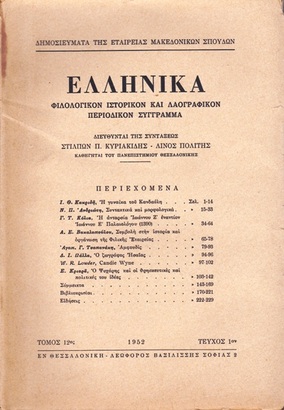At tenuis non gloria : Η ποιητική δόξα και η λεπταλέη Μούσα στην ποιητική παράδοση του Καλλιμαχισμού
Part of : Ελληνικά : φιλολογικό, ιστορικό και λαογραφικό περιοδικό σύγγραμμα ; Vol.46, No.2, 1996, pages 283-299
Issue:
Pages:
283-299
Parallel Title:
At tenuis non gloria : Poetic Glory and the Delicate Muse in the Callimachean Tradition
Author:
Abstract:
The first part of the article suggests that it is possible to identify a parallel for the emphatic antithesis in tenui labor; at tenuis non gloria (Virg., Georg. 4.6-7) in Callimachus, Hymn 2.10-11: ός μιν ίδη, μέγας ούτος, ός ουκ ίδε, λιτός εκείνος. / όψόμεθ', ω Έκάεργε, και εσσόμεθ'ουποτε λιτοί. Although "it is unusual for Callimachus to use μέγας as a term of approbation" (Williams), it ought to be recognised that these verses correspond to the advice of Apollo, αοιδέ, το μεν θύος όττι πάχιστον θρέψαι (fr. 1.23-4 Pf.): great size is appropriate to religious context, provided it is in accordance with divine magnitude. At the same time, it can be said that the theophany of the Prologue of Aetia fulfils the wish expressed in the Hymn. Virgil combines two scenes: he addresses Apollo in a formally ritualistic manner, but calls on him as the protector god of poetry, of the new Hellenistic poetry —the whole staging is a reminder of topoi in the Callimachean programme. In this way, the poetological function of the theophany in Aetia is rendered in the formal diction of Callimachus' Hymn 2. 10-11. Virgil's aim is to show that delicate poetry can be successful and that its authors can achieve glory. Callimachean poetry and poetics favour terms such as μικρός, ολίγος, λεπτός etc. Nevertheless, any poet naturally expects great success from his work. The contradiction between critical terminology and the characterisation of poetic glory within the frame-work of New Poetry is the subject of the second part of the article. Neither Callimachus nor Catullus were interested in defining the magnitude of the glory they expected. Propertius, on the other hand, often refers to the question of his personal repu- tation, on occasion using terminology that is clearly anti-Callimachean (EL 1.7, 3.1, 3.2). He refers to poetic glory in a funeral context and transposes it to the future because of the opposition of the official state towards the love elegy. Thus the contradiction under examination is linked with the conventions of the elegiac genre. Horace refers to the same antithesis when he likens the glory he is expecting from the Musa tenuis with the glory given by the pyramids (C. 3.30) and seeks the degree of size which elsewhere (e.g. C. 3.29.10) he rejects. In this way he illustrates the Virgilian declaration in tenui labor; at tenuis non gloria
Subject:
Subject (LC):




